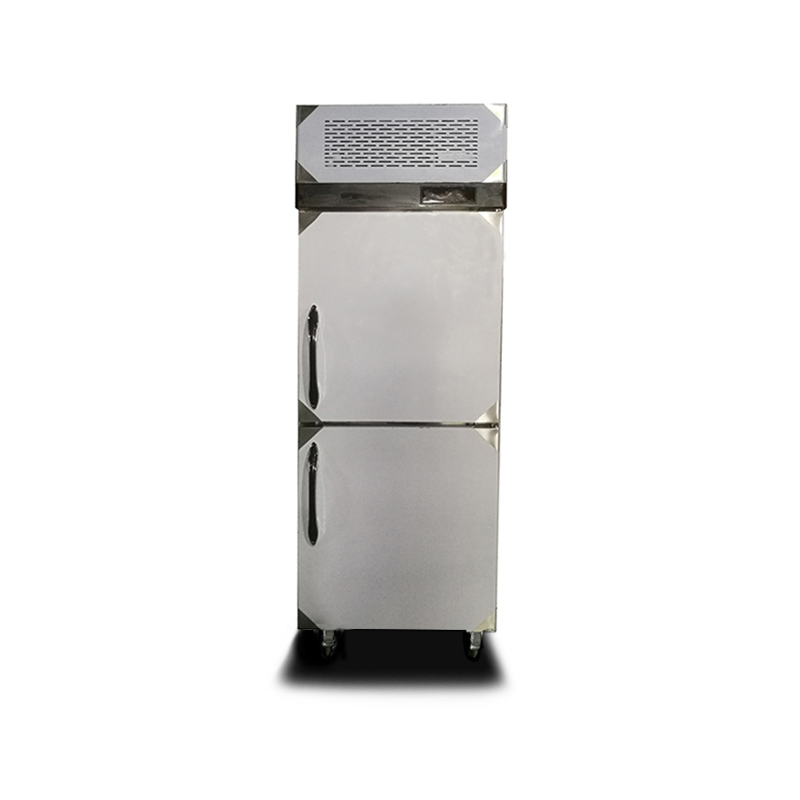1. Advanced Energy-Saving Compressor Technology
The compressor is the core of a refrigerator's refrigeration system, and its efficiency directly determines its energy consumption and cooling performance.
Inverter Compressor Technology
Traditional fixed-frequency compressors can only be turned on or off, with the motor operating at a fixed speed, consuming significant energy. Inverter compressors, on the other hand, automatically adjust their speed based on the refrigerator's internal temperature, avoiding unnecessary high-power operation.
For example, when the internal temperature reaches the set point, the inverter compressor will reduce its speed, reducing energy consumption and noise.
When the door is frequently opened or when a large amount of food is stored, the compressor automatically increases its speed to ensure rapid cooling and keep food fresh.
Inverter technology also reduces starting current and extends compressor life.
Significantly Quiet Performance
Inverter compressors operate more smoothly, reducing mechanical vibration and noise, creating a quieter kitchen environment and enhancing user experience.
2. High-Efficiency Insulation
Refrigerator insulation performance is key to reducing energy loss.
Polyurethane Foam Insulation
Modern upright stainless steel refrigerators use high-density polyurethane foam as insulation. This material has an extremely low thermal conductivity, effectively preventing cold air loss. High-density foam ensures uniform insulation across all refrigerator layers, minimizing heat exchange and reducing compressor workload.
Optimizing the thickness and uniform distribution of the foam layer is a key research and development priority for manufacturers.
Double-layer or vacuum door design
Some high-end models feature double-layer doors or utilize vacuum insulation technology to further enhance thermal insulation.
The double-layer door creates an insulating layer between the two layers, reducing heat transfer from the outside.
Vacuum-insulated doors virtually completely block heat conduction, significantly improving energy efficiency.
Sealing strip technology
The refrigerator door sealing strips are made of high-quality materials, ensuring a tight closure and preventing cold air leakage. They are also durable and age-resistant, ensuring long-term sealing performance.

3. Intelligent Temperature Control System
Intelligent temperature control technology achieves energy savings by precisely sensing and adjusting the refrigerator's internal environment.
Multi-point temperature sensors
Modern refrigerators are equipped with multiple temperature sensors to monitor temperature fluctuations in different areas of the refrigerator and freezer compartments in real time.
Based on this sensor data, the system intelligently adjusts compressor operating power to avoid overcooling.
Sensors also monitor ambient temperature and automatically adjust cooling strategies. Intelligent Energy Saving Mode
Based on user habits, the refrigerator automatically switches to energy-saving mode. For example, Night Mode reduces power consumption.
When the door is closed for extended periods, the refrigerator automatically reduces operating intensity to save electricity.
Some models feature remote control and app management, allowing users to manually adjust the temperature and mode as needed.
Temperature Uniformity Control
Intelligent fan and airflow distribution ensure uniform temperature inside the refrigerator, reducing waste caused by uneven heating and cooling.
4. Environmentally Friendly Refrigerants
Refrigerants have a significant impact on the environment. Modern refrigerators use environmentally friendly refrigerants to reduce the ecological burden.
Low GWP Refrigerants
Traditional CFC refrigerants are ozone-depleting and have high global warming potential (GWP), posing significant environmental risks.
New refrigerants, such as R600a (isobutane), have extremely low GWP values and contribute minimally to global warming.
R600a also offers excellent cooling performance and energy efficiency, contributing to energy efficiency in refrigerators. Fluorine-Free, Environmentally Friendly Refrigerants
Using refrigerants that contain no fluorinated compounds reduces ozone layer depletion and complies with the Montreal Protocol and international environmental regulations.
Safe and Environmentally Friendly Design
Although new refrigerants are somewhat flammable, the manufacturer ensures safe use through optimized system design and safety measures.
5. Energy-Efficiency Certifications and Environmental Standards
Formal certifications are important indicators of a refrigerator's energy-efficiency and environmental performance.
International Energy Star Certification
This certification is a globally recognized energy-efficiency standard awarded only to products that meet stringent energy efficiency standards.
Certified refrigerators consume significantly less energy than comparable standard products.
The certification also covers environmental requirements for production and recycling.
China Energy Efficiency Label
Level 1 energy efficiency is the highest energy-efficiency rating, meaning the refrigerator consumes the lowest electricity in daily use.
Paying attention to energy efficiency labels when purchasing can help you choose energy-efficient and environmentally friendly products.
Other regional certifications, such as the EU Energy Efficiency Label and Japan's Top Runner standard, also have strict requirements for refrigerator energy efficiency.
6. Environmental Advantages and User Value
Energy efficiency and environmental protection are not only technological advancements; they also bring practical value and social contributions. Reduce carbon emissions
Reducing electricity consumption indirectly reduces carbon dioxide emissions from coal-fired power generation and other fossil fuels, contributing to climate change mitigation.
Reducing household energy costs
Energy-saving refrigerators significantly reduce electricity consumption, resulting in significant savings on electricity bills over time and lowering household living costs.
Extending refrigerator lifespan
Advanced energy-saving technologies often result in more stable operation, reduced failure rates, longer lifespans, and reduced electronic waste.
Supporting a green lifestyle
Choosing energy-saving and environmentally friendly appliances demonstrates a sense of responsibility for environmental protection and promotes sustainable social development.

 English
English عربى
عربى Français
Français русский
русский Español
Español 中文简体
中文简体







